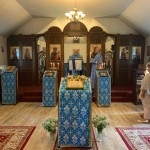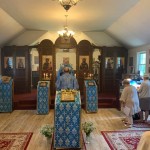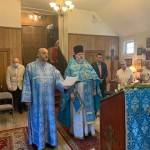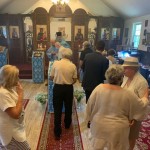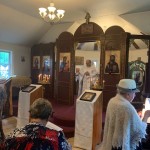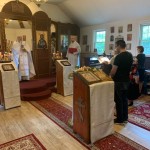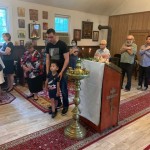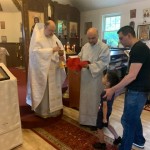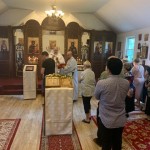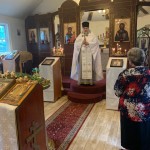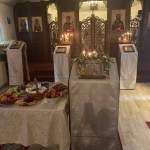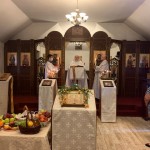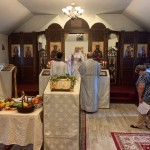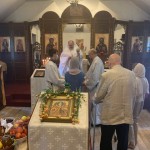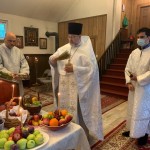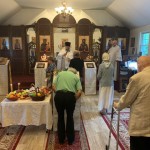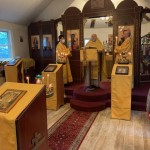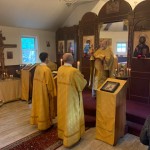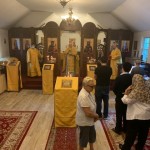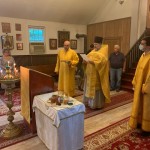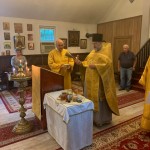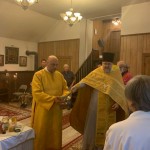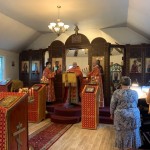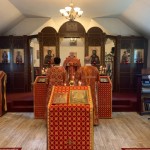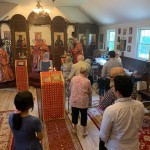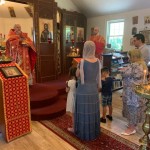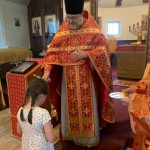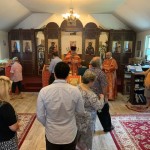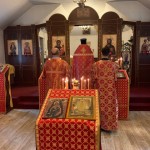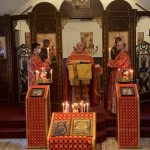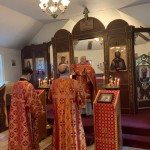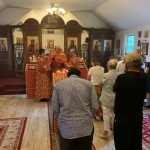On August 28, on the feast of the Dormition of the Most Holy Mother of God we held a nice celebration at St. George Church. Our Rector, Archpriest Igor Tarasov served the Divine Liturgy. After the Gospel lesson he preached a homily in Russian. An English translation of that homily is as follows:
““In giving birth Thou did preserve the virginity; and in falling asleep thou did not forsake the world, O Theotokos”, – by these words of the festal troparion today we praise the Most Pure and Blessed Virgin Mary”.
“Why does the Church emphasize those two events in the life of the Most Holy Mother of God – Her giving birth to Christ and Her falling asleep? This is so because in the life of any person these are the most important events, someone’s birth and passing away. Human life is a journey from the point of birth to the point of death. A birth of a man is a joyful event. However, from the Sacred Scripture and from our own life experience we know that because of the fall of humanity the very birth of a man is filled with bitterness. A famous French writer, Victor Hugo said: “Man is born with a cry and dies with a groan”. The beginning and the end of life is bitter. This is the bitterness of sin, and it appeared because man did not wish to abide in God. Therefore, the sin like venom penetrates the whole essence of the human life and makes it poisoned. It brings man sufferings from birth and until death. God did not create man as sinful, but man by himself, by his own will, tasted the bitterness of sin”.
“Now, the significance and joy of today’s feast of the Dormition is that the Mother of God overcame that bitterness of sin. That event tells us that a miracle took place: an end of the earthly life, something always linked to pain and sorrow, to suffering and unhappiness, for the Theotokos became bright and joyful. When She gave birth to Her Son, Jesus Christ, the Mother of God remained a Virgin. And Her Dormition was also awesome and wonderful. There was no fear of death, no sorrow, no bitterness, no lamentation, but it was a passing from earthly life to life eternal. The Mother of God did not die but fell asleep in this world to wake up in the heavenly glory, in the Kingdom of God”.
“Dear brothers and sisters! We are accustomed to think that the laws of the sinful world inevitably dominate over man, and that the sin is so powerful that it would never let us go, from our birth until death. It is true: man is born with sinful inclination and he dies in sufferings because of sin. However, here is the example of the Most Holy Theotokos: She also lived in this world full of sin. But by the power of God’s grace and by Her own strife for holiness She overcame the sin. Thus we should not think that sin is something inevitable, because the Mother of God destroyed that dependence using the gracious way opened by our Savior Jesus Christ to all of us. By Her own life She demonstrated that now the sin does not have to dominate over humanity”.
“The Holy Church gives us gracious means to make our soul free from sin and to keep it in God’s hands. Look at the icon of the Dormition: we see that the Lord Jesus Christ is holding the most pure soul of His Mother in His hands. This is the image of God’s Providence over the world, of His Providence for every human soul”.
“Let us then beseech the Theotokos that She may help us, so our souls may be in God’s hands as Her soul was at the time of Her Dormition. Let us ask that we may always be with the Lord, that we may inherit eternal life and that by overcoming the sufferings of our life journey we remember that the Lord is leading us to salvation by the prayers of His Most Holy Mother”.
During the Litany of Fervent Supplication, Fr. Igor proclaimed a petition beseeching the Lord to spare the faithful from the outbreak of the disease.
The choir prayerfully performed hymns dedicated to the Most Holy Mother of God and Her Dormition during preparation for Holy Communion.
Following the dismissal of the Liturgy the Rector and the altar server performed the rite of glorification singing the troparion, kontakion and magnification of the feast before the icon of the Dormition in the middle of the church. Then the Rector congratulated all the faithful on the feast.

